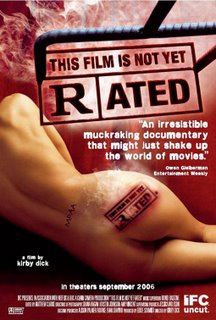This Film Is Not Yet Rated
Directed by Kirby Dick
IFC
For a great many years, a secret group of people known as the Motion Picture Association of America have held the success of edgy films they deem beyond R-rated in their hands. An NC-17 drastically reduces the number of theatres a movie can be distributed because all of the chains won't touch it, newspapers and TV won't run ads for the already-limited release, and there's still a stigma that NC-17 means hardcore sex action like the mythical rating it replaced, the X.
The controversy surrounding the ratings board is not a new one by any means, but finally a filmmaker has decided to lay it all out for us and show visually how ridiculous the board is. As a replacement for the earlier Hays Code, which had rules like "gangsters need to reform or die" by the end of those films, the MPAA was set up by Jack Valenti and the studios as an effort to allow more questionable content--the movies were unable to keep up with the times under the old code. Unfortunately, since the board is set up by the studios, they have incredible influence over what constitutes a particular rating, and the independents have absolutely no power.
And this is where the NC-17 comes into play--indies, the edgy fare that usually tries to push sexuality to a new level, often get slapped with this financially-burdensome rating. Side-by-side comparisons of studio films to independent films are shown in This Film Is Not Yet Rated, scenes that are the exact same in content but are given harsher ratings because the sex is usually not heterosexual--it's "not usual," or it's a sex act deemed too harsh. Also, incredibly violent imagery is given a pass, especially if it's bloodless. Peirce talks about how in Boys Don't Cry, she has an extremely violent scene where someone's head gets blown off, which was OK, but Chloe Sevigny having an orgasm for "too long" was one of the reasons the film got the NC-17 at first.
Despite claims by Valenti that most movies given the NC-17 are for violence, this is definitely shown as not to be true. Also, the board seems to pride itself on not being a censoring body, so they don't tell filmmakers what they have to do to get their movies from the harsh NC-17 to the R, but they in effect censor the movie because the film will now have to be re-cut. Matt Stone appears talking about the various experiences with Orgazmo, South Park, and Team America--illuminating that indie Orgazmo got an NC-17 and the board didn't tell he and Trey Parker what they needed to cut to get it to an R, but were very specific when it came to Paramount's South Park.
Kirby Dick set out to figure out who these people were, the raters who have been kept secret, by hiring a private investigator. This is fairly interesting--we of course find out who the board is after awhile, and how the requirements to be on the board seem to be a little fudged, but the real interesting moments are when Dick interviews all the different directors who had films judged by the MPAA as NC-17 and had to cut arbitrary footage to knock it down to an R. Especially illuminating are Kevin Smith, John Waters, and Kimberly Peirce (Boys Don't Cry), but all of the filmmakers involved offer great insight. I also liked Wayne Kramer and Maria Bello talking about the board's problem with a brief glimpse of Bello's nether-regions in The Cooler.
And perhaps the funniest part of the film is Dick's submission of this film to the MPAA, which is easily given the NC-17 due to its hit list of sex scenes that were cut from the original films. This is where we learn about the appeals process, and the people involved on that board, which happen to be loads of representatives from the theatre chains, and two religious figures. Basically, we see the MPAA as it is: a legal ruling board that, though claiming to merely be rating movies for parents and not disallowing any content, is able to cripple a movie in two ways through the NC-17--artistically, if the movie needs to be cut to make the R, or financially, if the film decides to stay NC-17.
It is clearly an imperfect board--if you ask me, once a movie gets into adult territory, there should be no limit to what can be done. I can see where the board thinks they are doing a service--maybe it's because they know that with the dwindling staffs at bare-bones multiplexes, kids will find their way into these movies and they want to make sure they see nothing "unusual." Of course, Waters makes a great point--these kids have seen some of the most foul sexuality just by logging onto the internet. And there's still the matter of the ultra-violent content, which is briefly explored in this film and an ultimate conclusion is, "Yeah, it's bad to see lots of violence, but we don't know how to itemize what kind of violence is most hurtful to see." But besides that, adults should be able to figure out for themselves what they want to see--and with an NC-17 rating, a film will have a hard time finding an audience outside of New York and Los Angeles.
A definite must-see if it makes it to your neck of the woods. In Nashville, I'd bet on Belcourt.


1 Comments:
I can't wait to Mr. Dick's great movie, but (and ironically, at least partially due to the MPAA, probably) I'll have to wait to see it on DVD in my little corner of the world .. it makes me so angry I can't see straight when I think about how we let our movies get rated by a bunch of sexually repressed idiots
Post a Comment
<< Home